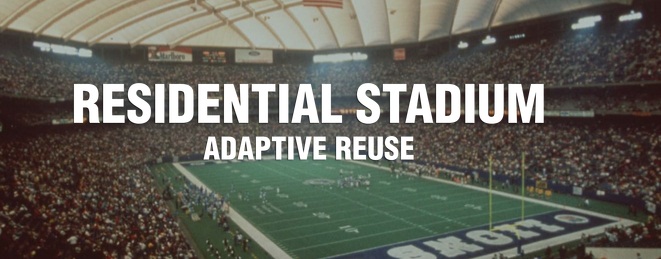Register November 21, 2018 | Submit November 21, 2018 | Student Architecture Competition
Residential Stadium
Adaptive Reuse
BRIEF
On this occasion Russia was chosen to host the event. A total of twelve stadiums in eleven Russian cities have been built and renovated for the FIFA World Cup.
But have you ever thought about what happens when Olympic arenas, World Cup stadiums or other costly sporting venues close at the end of the colourful events for which they were designed? Many go on to host local sports clubs. Others, though, become proverbial ‘white elephants’, scraping by as glorified parking lots, dirt tracks for stock-car racing and even, as in the case of Montreal’s spectacular Olympic Stadium, as a swine-flu vaccination centre.
In RESIDENTIAL STADIUM: ADAPTIVE REUSE, Archstorming will analyze how architecture can provide solutions in stadium designs, so they can always be reused after the event has finished.
Giving the fact that the World Cup 2026 will be held in North America (USA, Canada and Mexico), the project for the stadium will be located in New York City (USA).
The proposed stadiums can:
- Work as both sports arena and residential building at the same time.
- Adapt to sports arena or residential building depending on the required use or
- Convert to residential building permanently after the sports event has finished.
The stadium could have the following (indicative) program: Soccer field, Stadium stands, Residential units (recommended size: 30 m2 to 100 m2), Restaurants, Offices, Shops and commercial spaces, Multipurpose spaces, Bathrooms, Gardens and public spaces.
SCHEDULE
NOV 21st REGISTRATION CLOSESNOV 21st SUBMISSION DEADLINE
NOV 21st – DEC 6th JURY DECISION
DEC 6th WINNERS ANNOUNCED
AWARDS
1-100 PARTICIPANTS
PRIZES
1st – 2.000 €
2nd – 1.000 €
3rd – 500 €
+10 HONORABLE MENTIONS
Picture
FEE
50€ + VAT
Register
101-200 PARTICIPANTS
PRIZES
1st – 3.000 €
2nd – 1.500 €
3rd – 500 €
+10 HONORABLE MENTIONS
Picture
FEE
65€ + VAT
NOT OPEN
201-300 PARTICIPANTS
PRIZES
1st – 4.000 €
2nd – 2.500 €
3rd – 1.000 €
+10 HONORABLE MENTIONS
Picture
FEE
80€ + VAT
NOT OPEN
301-350 PARTICIPANTS
PRIZES
1st – 5.000 €
2nd – 3.500 €
3rd – 1.500 €
+10 HONORABLE MENTIONS
FEES
1-100 PARTICIPANTS
FEE
50€ + VAT
101-200 PARTICIPANTS
FEE
65€ + VAT
201-300 PARTICIPANTS
FEE
80€ + VAT
301-350 PARTICIPANTS
FEE
100€ + VAT
JURY
Julie Hiromoto
HKS
New York (USA)
Barozzi
Bruno | Marcelo | Silvio
BCMF Arquitetos
Belo Horizonte (Brasil)
Barozzi
Rosa Agraz
Arroyo Solís Agraz
Mexico City (Mexico)
Barozzi
Borina Andrieu
Wilmotte & Associés
Paris (France)
Barozzi
Kerem Yazgan
Yazgan Design
Ankara (Turkey)
WEBSITE
https://www.archstorming.com/info.html?lang=en
For more information about this competition, please contact us.
